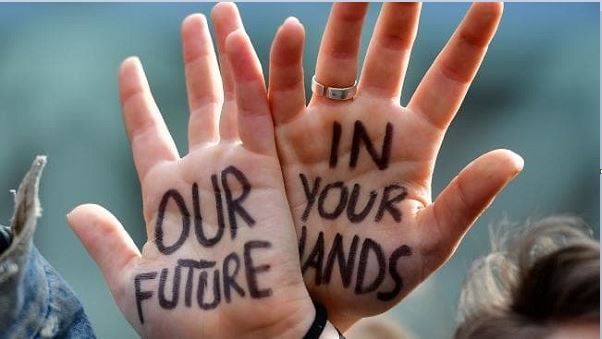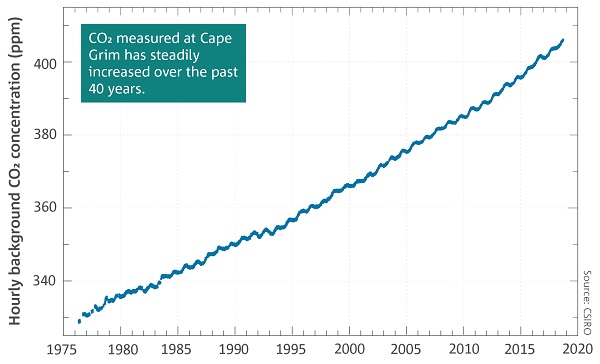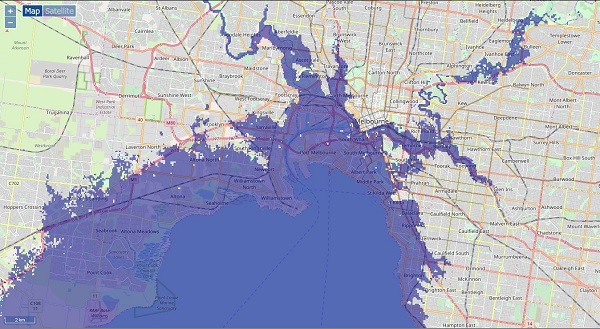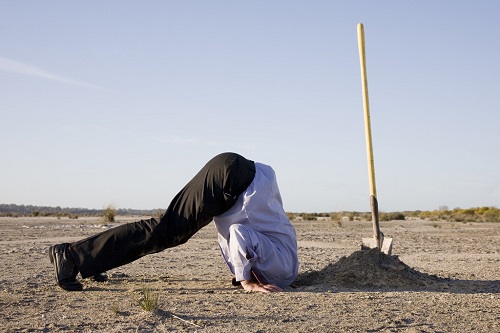
Greta Thunberg, the girl who can’t quit, was asked to talk to the billionaire entrepreneurs in Davos:
- “I don’t want you to be hopeful. I want you to panic. I want you to feel the fear I feel every day. And then I want you to act,” she told them.
She also said:
- The emissions are increasing and that is the only thing that matters.
Our Australian BOM State of the Climate 2018 (pdf here) shows us CO2 at Cape Grim:

This NASA site says that current levels of CO2 were last reached in the Pliocene, 3-5 million years ago when the sea levels were about five to 40 meters higher than now and the planet roughly 3 to 4 degrees Celsius warmer than today. Four degrees is generally considered incompatible with civilised life. That is our legacy as the effects play out over the centuries. The midpoint of around 20 metres SLR is devastating. Checking the Firetree flood maps, this is Melbourne at 20 metres:

That will take centuries, but the 2-3 metres that we are increasingly told by scientists to use as a planning guide now will seriously disrupt more half the world’s major cities and displace hundreds of millions.
Clearly we need to turn down the climate dial down to 350 ppm as fast as possible. James Hansen told us in 2007 that the climate is already dangerous. For a safe climate we need to take CO2 out of the air to reach 350 ppm ASAP.
The Coalition Coalsheviks will never be persuaded, so they need to be defeated.

The only way to do this, I think, is to face the issue squarely.
When the issue looks impossible, we need to take the first step, but leadership needs to come from government at every level.
Labor’s Climate Plan which we took to the 2019 election, was fit for purpose, but never properly explained or defended. Critically we allowed the Greens to call it a dog’s breakfast, and consistently represent it as no advance on the policies of the Coalition. In the end we had a shouting match about a coal mine, rather than a discussion about the climate emergence, as the Reef was dying before our eyes, and our Pacific neighbours were facing inundation, fires, drought and floods ravished the land, and we were increasingly told about an extinction crisis emerging.
We should retain many of the features, including the facility for larger emitters to buy offsets. Warwick McKibbin, who modelled such a scheme at the request of the Abbott government found that to rule out the purchase of offsets, here and abroad, was simply bad policy, and insignificant in its cost effect.
He also says that to focus on targets in not the key issue. Key is to reduce emissions as much as possible, consistent with the science, at cheapest cost.
Labor’s targets were based on The Climate Change Authority recommendations dating back to 2014. Next election it’s best strategy would be to do as it promised this time, re-vamp the Authority and under its supervision to conduct a climate change audit, using our best expertise allowing everyone input, and at the same time building a public constituency of support. We had that proposal, which takes the issue out of political back rooms and gives everyone a say and a stake, but no-one mentioned it during the election. No-one at all.
Our youth are well aware of the fact that their future is in jeopardy, as they showed during the School strike 4 climate where they put the case bluntly and forcefully, but with impressive scientific literacy.
If we make 2021 a climate election I believe we will win. Politicians need to engage authentically with young people, their hopes and fears, name the emergency and show that political leaders are prepared to take fair dinkum action. We need young people to feel that their vote will actually make a difference.
Last election, leaving Queensland aside, Labor won 62 of 121 seats. If we enlist the young of Greater Brisbane alone we can win the next election. I think we can do much better than that.
See also: For a longer, more complete account of how we got to this situation, see Climate emergency – an existential risk requiring action
Update: It’s worth looking back, I think, to Professor John Wiseman’s identification of the emergency, and how the prime minister should respond. See Climate change: reconnecting politics with reality. That was 2013.

Brian: Rapid population growth makes the whole climate issue a lot more dangerous. (World population 2.5 times what it was when I left school, Australian population more than 4 times what is was when I started school.)3 billion when I left school to over 7 billion now.)
A smaller population would make it easier to respond to climate disasters by moving people or increasing food production.
John, there is one European climate scientist, mentioned by David Karoly on Q&A, who thinks that by 2100 there will only be a billion humans left on the planet because of the effects of climate change. Bob Brown mentioned the same thing in an interview about what drove his crusading zeal. I’ve been trying to find out who it is, with no luck so far.
Brian: I agree with Adam Bandt. The climate plan Labor took to the last election was a dog’s breakfast. A dog’s breakfast which was unfit for the purpose of explaining to mere mortals like me why I should support their climate policy.
What I am interested in is what Labor is proposing to do during the next term of government, I don’t want a lot of babble about elite acronyms like the ACCC and NEG or, for that matter, the Paris accord. What I want to know is the concrete stuff. Contracts for new renewable capacity signed by the end of the next term, what they are going to do to stop the retailers from ripping us off etc.
If I had run the Labor policy past the resident plain English expert she would have been a lot less polite than Adam Bandt.
One of Labors problems at the last election was that they had had 6 yrs to prepare a detailed plan in a whole lot of areas that was hard for mere mortals to understand and easy for the opposition attack dogs to attack.
John, I’ll say more later, but:
The states run electricity, not the Commonwealth government.
And leaving NSW aside, LNP win by a bigger margin.
Leaving Victoria aside, LNP win by a bigger margin.
Blame Queensland if you want but it was a National Election.
The Senate is not Democratically representative nationally by design and that’s where it’ll all be decided.
Jumpy, In Qld Labor won 6 out of 30 seats. Leaving aside the territories, nowhere else was the vote so lopsided. This is not the first time Qld has effectively determined the election in favour of the conservatives. It is obvious that there are special considerations here.
All I’m saying here is that with a fair dinkum climate policy, which named crisis for what it is and proposed a credible path forward, then promoted to convince the young of Greater Brisbane, let alone Queensland generally and the rest of Australia, Labor could have won the election.
You try to distract, as usual.
More to the point, I’m suggesting we don’t back off next time, but go harder on climate.
Brian, I didn’t try to distract from anything you said, just highlighted one bit and provided perspective.
ALP ran pretty bloody hard on Climate change rhetoric in the campaign I saw up here.
If their policies didn’t match that rhetoric then that’s on them.
My anecdotal experiences about 3 months before the election campaign were ALP would win. There felt like a change happening LNPs way as Bob Browns clown show rolled up the State.
Folk up here have an aversion to greens due to years of ridicule from them ( see Dawson candidate in full head tilt )and see ALP/greens as an informal coalition.
To be honest, I think vegetation management laws saw Labor and The Greens welded firmly together in terms of the farm sector’s perspective.
For years, the greatest threat to the GBR was said to be farm runoff according to green groups, effectively ignoring climate change.
I did have a look at the performance seat by seat. The Greens struggled to break into double figures in the provinces. Their best chance of getting ahead of Labor would seem to be Brisbane, followed by Ryan.
Interesting on farm runoff.
As I recall, sediment outflow from rivers was one of the areas Peter Ridd researched, until the Uni he worked at decided to Get Ridd of him.
In Dawson it looks like the almost exact share of the ALP and green vote went to ON.
Obviously it doesn’t work like that in reality, it’s more complicated than a direct transfer, but it’s interesting.
They’ve attacked progress up here on farming, dams, nuclear power, roads, mining etc for years using red, green and black tape from their inner city cafes and Uni campuses.
Gillard teaming with them in 2010 under the “ Moving Forward “ banner didn’t help perceptions.
Dawson result.
Ambi, I’ve got a draft post on Ridd in the bin. Some day it might get finished.
The short story is that I think he was on the money when he said that runoff didn’t do much to the reef. However, he went beyond that, said the reef biologists work was rubbish and that the GBR would recover.
From memory his basic academic quals were in physics and his work was in marine water turbidity. He crossed a line, and I can understand why the reef biologists were cranky with him.
Doesn’t mean that the reef scientists work was perfect, though.
I’ve added a link to Professor John Wiseman’s identification of the emergency, and how the prime minister should respond. See Climate change: reconnecting politics with reality. That was 2013.
John, I want to re-read the Labor policy again, the post and the Greens policy before commenting further.
On an initial look at how it was written, it was all over the place. When I checked it out in my post, however, it covered most of the bases and ticked all the boxes.
Labor did not promote or defend it well, and can’t in the end blame others for that.
However, Adam Bandt, Di Natale and other candidates consistently said it was no better than the Coalition’s stance. That was simply not true.
Brian:
That was what i was looking about when i said it was a dogs breakfast. And i probably read it in a lot more detail and understanding than the average voter.
Part of Labor’s problem with climate action is that the losers from climate action are traditional Labor supporters like coal miners. The Greens don’t have this problem.
John, the average voter wouldn’t know the policy was there, and journalists and political commentators often didn’t look. There was a classic when ABC RN had a discussion about homelessness. There was no awareness of policies that Labor and the Greens actually had, but that didn’t stop these socalled experts from complaining that pollies ignored the problem.
The Wiseman link above is interesting about the shape of any policy. An Australian Climate Solutions Act setting up a Australian Climate Solutions Taskforce chaired by the PM and then six plans to cover the whole spectrum of emissions.
Fine and good, except the PM would have to give up his/her day job.
Brian: Had a look at Wiseman’s stuff. Not overly impressed. Looks like an implementation plan written by by an academic who lacked experience in making engineering things happen and, for example, wants to insert things like a specific transport mode change when it would be smarter to talk about what has to be achieved in broad terms and maybe talk about some of the alternatives and what criteria might be used to sort the alternatives out.
In terms of something to take to the people not very impressive at all. The detail merely provides convenient attack points.
In terms of industrial relations some practitioners talk about “conditioning.” You keep talking about some change you want to make when the opportunity is there until people have got used to the idea and the change takes place. The conditioning on climate change is clearly taking place with investment in renewable energy out of control and people putting panels on their roofs to save money. A smarter Labor and Greens might have understood what conditioning had achieved to date and provided a simple plan to aid the implementation.
Maybe we should talk to Mark Bailey and whoever was working with him. He took renewable energy from a standing start to being turbo charged. Things have slowed in Qld since he was moved to transport and Anthony Lynham took over.